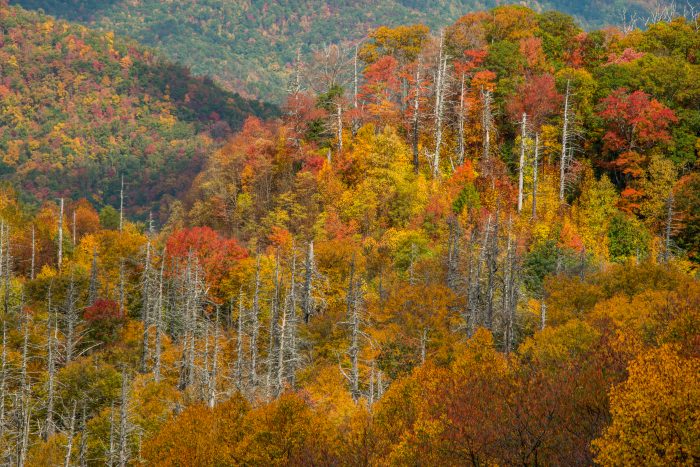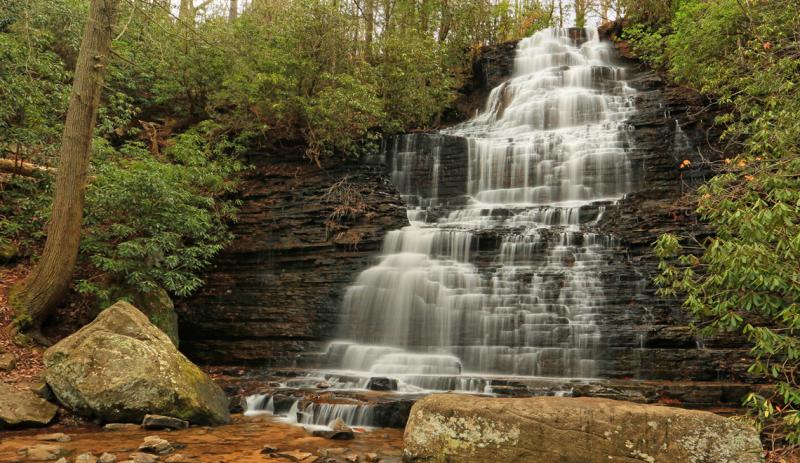Corridor K: Broad coalition celebrates long-fought win for right-sized road
After years of hard work and persuasion by SELC and our partners, the North Carolina Department of Transportation is ready to move forward with improvements to existing highways in western North Carolina, sparing the scenic and mountainous Nantahala National Forest from an unneeded new four-lane thoroughfare.
“This end result shows the power of collaboration and the importance of staying power when tackling our region’s big projects and their environmental impacts,” said Senior Attorney Sam Evans, who leads SELC’s National Parks and Forests Program.
Originally proposed in the 1960s, Corridor K was conceived as a four-lane highway connecting Chattanooga, Tennessee and Asheville, North Carolina, to support factories and freight.

Win-win solution for N.C. mountain highway
But the concept was flawed from the beginning. While four lanes made sense for many long stretches of the route, the destruction and expense necessary to put a four-lane road through the region’s pristine national forests could never be justified. This was especially true in areas of the mountains where the biggest economic assets are clean trout streams and scenic vistas.
The easiest and most useful segments along Corridor K were built or improved first, eventually leaving only two sections incomplete—one in western North Carolina and another in east Tennessee. But, despite the hefty expense involved and the environmental damage from replacing existing roads with new four-lane highways, the Tennessee and North Carolina DOTs repeatedly proposed to do just that.
In past plans the North Carolina DOT wanted to build a four-lane highway through the Nantahala National Forest, cutting in half a vital corridor for wildlife, marring the viewshed from the Appalachian Trail, and threatening prime trout streams. Meanwhile, the Tennessee Department of Transportation proposed carving a new highway through the Cherokee National Forest, blasting across trails and though recreation areas like Chilhowee Mountain, Rock Creek, and Goforth Creek Canyon.
These billion-dollar proposals would have slashed wide swaths through steep mountain forests, endangering forest ecosystems and pristine streams. Far from encouraging economic development, the roads would have hurt one of the region’s primary economic drivers: outdoor recreation. Blasting from both projects would have led to acidic run-off into mountain streams.
“These projects were not only expensive and destructive, they were completely unnecessary,” said Evans. “The existing two-lane roads could easily accommodate projected traffic levels with far cheaper upgrades like passing lanes and turning lanes in key areas.”
As a result, SELC and its partners, including Ways South, The Wilderness Society, MountainTrue, and the Sierra Club, were able to show that the overbuilt highways simply weren’t eligible for funding or required permits. To environmentalists, Corridor K was a threat dangling over public lands and waters. To local residents who needed a safer, more reliable roadway, it was a broken promise.
But now there is excellent news: Both North Carolina and Tennessee are now planning to make upgrades to existing roads rather than building new-location freeways.
North Carolina DOT released its final decision on Thursday, March 25 after its proposal last fall received positive feedback from local government and environmental groups alike. The scaled-back proposal will improve transportation and safety, protect and improve access for recreation, support local economies, and restore connectivity for wildlife like black bears. The new project will upgrade Highways 143 and 28 to connect Robbinsville, N.C., to the existing four-lane highway in Stecoah Valley, N.C. The project will include an innovative land bridge protecting wildlife and hikers on the Appalachian Trail, which will be a tourist attraction in itself.
“Local support was absolutely critical to the project’s success,” said Melanie Mayes, chair of Ways South, a regional nonprofit working for environmentally responsible transportation projects. “The final decision incorporates feedback not only from environmental groups, but also the communities along the route.”
We’re also pleased to report that Tennessee DOT is headed in a similar direction, with a new proposal to upgrade existing roads rather than a four-lane bypass through the Cherokee National Forest. U.S. Highway 64 will see upgrades where it follows the Ocoee River before it flows into Lake Ocoee.
This end result shows the power of collaboration and the importance of staying power when tackling our region’s big projects and their environmental impacts.
Senior Attorney Sam Evans, leader of SELC’s National Parks and Forests Program
Tennessee DOT is proposing a number of reasonable, realistic improvements that will improve safety and reliability. One tentative upgrade would use a tunnel and two bridges to avoid an area that has been plagued by rockfall in the past—a change that would also improve safety for pedestrians and whitewater rafters. Other parts of the proposal are more modest upgrades, primarily addressing sharp curves. State officials anticipate these upgrades will provide reliable service for decades if not longer.
Finishing Corridor K without unnecessary harm or billion-dollar price tags is now possible because we and our partners were at the table with state officials, working to find solutions that could meet federal design and permitting requirements within realistic budgets. That required not just a knowledge of the law, but a deep understanding of local needs and the context that makes western North Carolina and east Tennessee so special.

